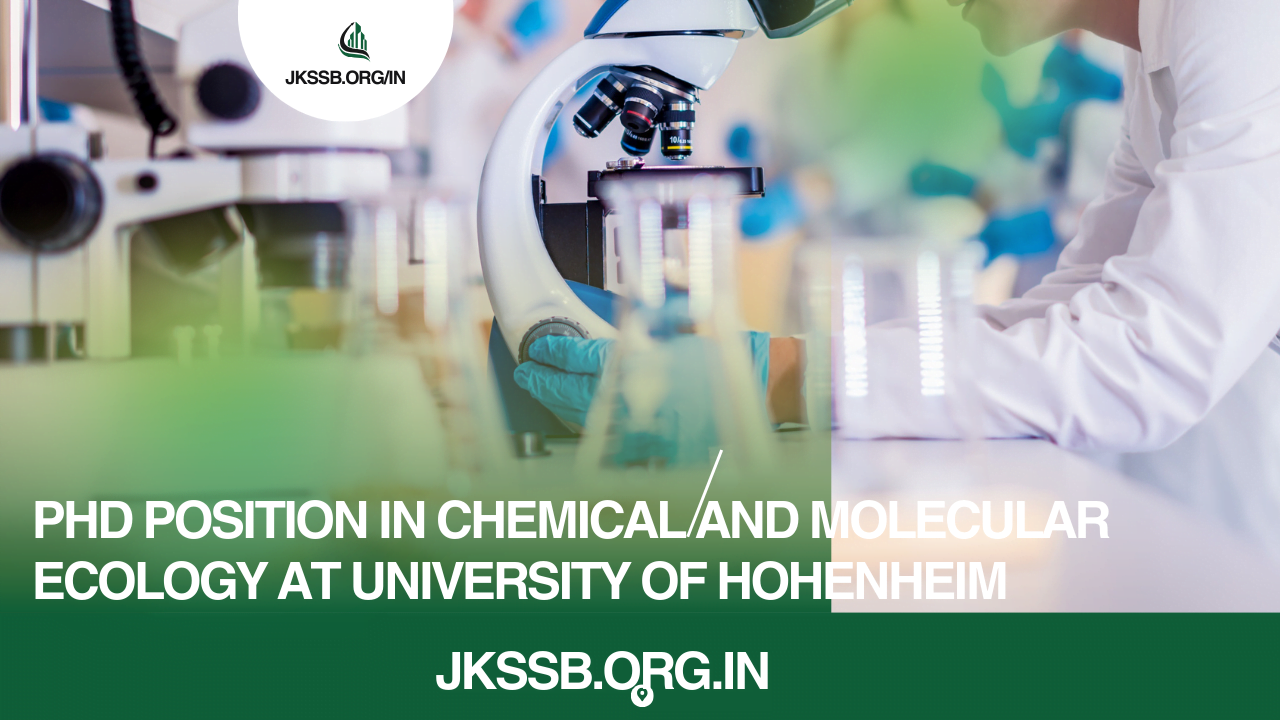PhD Position in Chemical and Molecular Ecology at University of Hohenheim

The University of Hohenheim in Germany offers a unique opportunity for aspiring researchers through its PhD position in Chemical and Molecular Ecology. This role is designed for individuals who are passionate about advancing their knowledge and contributing to cutting-edge research in this dynamic field. The PhD position is set to commence on a specified date and is structured to span over a period of three years, providing ample time for in-depth study and substantial contributions to the field.
The primary focus of this research associate role revolves around exploring the interactions between plants and their environment at the chemical and molecular levels. This includes understanding the complex chemical signals that govern these interactions and their broader ecological impacts. The position is embedded within a vibrant academic environment, fostering collaboration and innovation.
Supported by a team of experienced researchers and academics, the PhD candidate will have access to state-of-the-art laboratory facilities and resources, ensuring they are well-equipped to undertake their research. The University of Hohenheim is renowned for its commitment to scientific excellence and offers a stimulating environment that encourages intellectual growth and professional development.
This PhD position is an excellent opportunity for those looking to delve into the intricacies of chemical and molecular ecology, contributing to a deeper understanding of ecological interactions and their implications. The support and resources available at the University of Hohenheim make it an ideal setting for pursuing advanced research and achieving significant scientific milestones.
Research Focus and Objectives
The research focus at the University of Hohenheim’s lab is centered around understanding the intricate dynamics between plants and their environment, particularly in response to herbivores. One of the primary research questions explores how plants react to herbivore attacks. This includes investigating the signaling pathways and biochemical mechanisms that plants employ to recognize and respond to these threats. The lab aims to elucidate the complex web of interactions that underpin plant defense mechanisms, including both direct defenses such as the production of toxic compounds and indirect defenses like the attraction of natural enemies of herbivores.
Another significant area of inquiry is the integration of environmental stimuli into plant responses. This involves studying how various environmental factors, such as light, temperature, and soil nutrients, influence plant behavior and adaptation. The research seeks to understand how these stimuli are perceived and integrated at the molecular and ecological levels to optimize plant survival and reproduction.
The evolution of plant responses to ecological interactions forms another cornerstone of the lab’s research. By examining the evolutionary history and adaptive significance of plant defense traits, the lab seeks to uncover the selective pressures and genetic changes that have shaped current plant defense strategies. This includes comparative studies across different species and ecosystems to identify common patterns and unique adaptations.
Mechanistic interactions and trade-offs between different plant adaptation strategies are also a key focus. The lab investigates how plants balance investment in growth, reproduction, and defense, and how these trade-offs influence plant fitness and ecological success. This research is vital for understanding the constraints and potentials of plant adaptation in changing environments.
To achieve these objectives, the lab employs a diverse array of methods, combining ecological, chemical, and molecular approaches. This interdisciplinary strategy allows for a comprehensive understanding of plant ecology and evolution, from the molecular mechanisms underlying plant responses to the ecological and evolutionary outcomes of these interactions.
The PhD position in Chemical and Molecular Ecology at the University of Hohenheim encompasses a wide array of responsibilities and central tasks. Primarily, the role involves conducting a series of meticulously designed experiments aimed at advancing the understanding of chemical interactions within ecosystems. These experiments are pivotal in deciphering the complex biochemical pathways and molecular mechanisms that underpin ecological interactions.
Development of new methods is another critical task expected of the PhD candidate. This involves innovating and refining techniques to ensure precision and reliability in experimental results. The candidate will be expected to stay abreast of current methodologies and incorporate cutting-edge approaches that can contribute to the broader field of Chemical and Molecular Ecology.
Performing chemical and molecular analyses forms the core of the research duties. The candidate will engage in extensive laboratory work, using advanced analytical tools and techniques to measure and interpret chemical compounds and molecular signals. This task demands a high level of technical proficiency and a deep understanding of the subject matter to draw meaningful conclusions from the data collected.
Experiment evaluation and documentation are equally vital components of the role. The PhD candidate must systematically assess experimental outcomes, ensuring that the results are accurate and reproducible. Documentation involves maintaining detailed records of procedures, observations, and findings. This meticulous record-keeping is crucial for the integrity of the research and for future reference.
In addition to research responsibilities, the PhD position includes certain teaching obligations. The candidate will be expected to contribute to course development and delivery, assisting in the instruction of undergraduate and graduate students. This may involve preparing and delivering lectures, supervising laboratory sessions, and providing guidance on research projects. Engaging in teaching activities not only enhances the candidate’s pedagogical skills but also enriches the academic environment of the University of Hohenheim.
The University of Hohenheim is seeking highly motivated candidates for the PhD position in Chemical and Molecular Ecology. To be considered for this prestigious role, applicants must possess a solid academic background and relevant practical experience. Specifically, candidates are required to hold a master’s degree or diploma in biology, environmental sciences, or a closely related discipline. This educational foundation ensures that candidates have a comprehensive understanding of ecological principles and methodologies essential for advanced research.
In addition to academic qualifications, practical experience in ecological experiments is crucial. Candidates should have a proven track record of conducting field and laboratory experiments, showcasing their ability to design, execute, and interpret ecological studies. Proficiency in data analysis and statistics is also mandatory, as these skills are integral to the research process. The ability to analyze complex datasets using statistical software will enable candidates to derive meaningful insights from their experimental results.
Furthermore, the University of Hohenheim places a strong preference on candidates who are familiar with multivariate statistics. This advanced statistical approach allows for the analysis of multiple variables simultaneously, providing a more comprehensive understanding of ecological interactions. Experience with various analytical and molecular techniques is also highly desirable. Techniques such as chromatography, mass spectrometry, and molecular cloning are frequently employed in chemical and molecular ecology research, and familiarity with these methods will significantly enhance a candidate’s suitability for the position.
Overall, the ideal candidate for the PhD position at the University of Hohenheim will demonstrate a robust academic background, substantial practical experience in ecological research, and proficiency in both data analysis and advanced statistical methods. These qualifications will ensure that the selected candidate is well-prepared to contribute to the cutting-edge research conducted within the Department of Chemical and Molecular Ecology.
Skills and Competencies
The PhD position in Chemical and Molecular Ecology at the University of Hohenheim demands a unique set of skills and competencies from prospective candidates. Chief among these is the ability to work independently. This skill is critical as the PhD journey often involves extensive self-directed research and problem-solving. Candidates are expected to demonstrate a high degree of autonomy in designing experiments, collecting data, and interpreting results. The capacity to work independently also indicates a strong sense of initiative and responsibility, which are essential traits for successful research endeavors.
Equally important is the ability to be an active team member. Research in chemical and molecular ecology frequently involves interdisciplinary collaboration, and the University of Hohenheim values candidates who can effectively contribute to a team. This includes sharing insights, actively participating in discussions, and being open to feedback. Teamwork fosters a productive and innovative research environment, enabling the collective advancement of knowledge.
Excellent written and spoken English skills are another fundamental requirement. Given the international nature of scientific research, proficiency in English is crucial for the clear communication of ideas, both in written publications and oral presentations. Candidates must be adept at articulating their research findings, drafting scientific papers, and engaging with a global academic audience.
Moreover, the University of Hohenheim seeks candidates who demonstrate a strong motivation and genuine interest in chemical and molecular ecology. This field is complex and continually evolving, requiring a deep-seated passion for understanding ecological interactions at the chemical and molecular levels. A motivated candidate is more likely to persevere through the challenges of a PhD program, contributing meaningful and original research to the field.
In conclusion, the ideal candidate for the PhD position at the University of Hohenheim will possess a blend of independence, teamwork, proficient English communication, and a profound interest in chemical and molecular ecology. These skills and competencies are essential for thriving in this demanding yet rewarding academic pursuit.
The University of Hohenheim offers a wealth of benefits and opportunities for PhD candidates in Chemical and Molecular Ecology. Firstly, the diverse work field is a significant attraction. The university provides a robust platform for interdisciplinary research, allowing candidates to explore various facets of chemical and molecular ecology. This diversity not only broadens the scope of research but also enhances the academic and professional growth of candidates.
Creative freedom is another substantial benefit. The University of Hohenheim encourages PhD students to pursue innovative research ideas and methodologies. This autonomy fosters a stimulating research environment where candidates can experiment and push the boundaries of their field. The supportive atmosphere ensures that every new idea is given the attention it deserves, promoting a culture of creativity and innovation.
Additionally, the university prides itself on a cooperative team environment. Collaboration is at the heart of the research culture at Hohenheim. PhD candidates have the opportunity to work closely with leading experts and fellow researchers. This collaborative ethos not only enhances the quality of research but also builds a strong professional network, which can be invaluable in future academic and professional endeavors.
The opportunity to enroll in a graduate program is another advantage offered by the University of Hohenheim. These programs are designed to complement and enhance the research experience, providing candidates with additional skills and knowledge that are pertinent to their field of study. This structured educational framework ensures that PhD candidates are well-prepared for both academic and industry roles post-graduation.
Beyond academic and research benefits, the University of Hohenheim also offers a range of additional perks. These include attractive pension schemes, access to extensive sports facilities, and job tickets for convenient transportation. Such benefits contribute to a balanced and fulfilling PhD experience, ensuring that candidates can focus on their research while enjoying a high quality of life.
The application process for the PhD position in Chemical and Molecular Ecology at the University of Hohenheim is a critical step towards securing this opportunity. To begin with, applicants are required to prepare a comprehensive application package. This package should include a letter of motivation, a detailed curriculum vitae (CV), and copies of academic degrees. The letter of motivation should clearly articulate your research interests, relevant experience, and reasons for applying to this particular program. Your CV should provide a thorough overview of your educational background, research experience, publications, and any other pertinent professional activities.
Once all the necessary documents are gathered, they must be compiled into a single PDF file. This can be efficiently achieved using various software tools that allow for the combination of multiple files into one cohesive document. Ensuring that all relevant information is clearly presented and well-organized within this single PDF is crucial, as it reflects your attention to detail and organizational skills.
The completed application package should then be submitted through the University of Hohenheim’s job portal. The job portal is designed to streamline the application process, allowing for the efficient handling and review of applications. Detailed instructions on how to use the portal can usually be found on the university’s website, ensuring that applicants can navigate the submission process without difficulty.
It is important to adhere to the specified application deadline to ensure that your application is considered. The deadline for submission is [insert specific date], and late applications may not be accepted. Therefore, it is recommended to start the application process well in advance to account for any unforeseen delays and to ensure that all documents are prepared to the highest standard. By following these steps diligently, applicants can maximize their chances of being considered for this prestigious PhD position.
Contact Information and Further Resources
For candidates interested in pursuing the PhD position in Chemical and Molecular Ecology at the University of Hohenheim, direct contact with the supervising faculty can provide valuable insights and guidance. The primary contact for this position is Prof. Dr. Anke Steppuhn. Applicants are encouraged to reach out to her for any specific queries or additional information related to the research scope and expectations.
Contact Details:
Prof. Dr. Anke Steppuhn
Department of Chemical and Molecular Ecology
University of Hohenheim
Email: anke.steppuhn@uni-hohenheim.de
Phone: +49 (0)711 459 12345
Besides direct communication, prospective candidates should familiarize themselves with the official job posting and the application process. The University of Hohenheim has provided comprehensive resources that detail the application requirements, deadlines, and necessary documentation. To ensure a smooth application process, applicants should access the university’s secure internet site for applications, where they can submit their materials and track the status of their application.
Useful Links:
Official Job Posting
Application Portal
Department of Chemical and Molecular Ecology
For those seeking further information about the university’s environment, research facilities, and academic culture, additional resources are available on the university’s main website. These resources provide a broader understanding of the academic and social life at the University of Hohenheim, helping potential candidates make an informed decision about their application.



